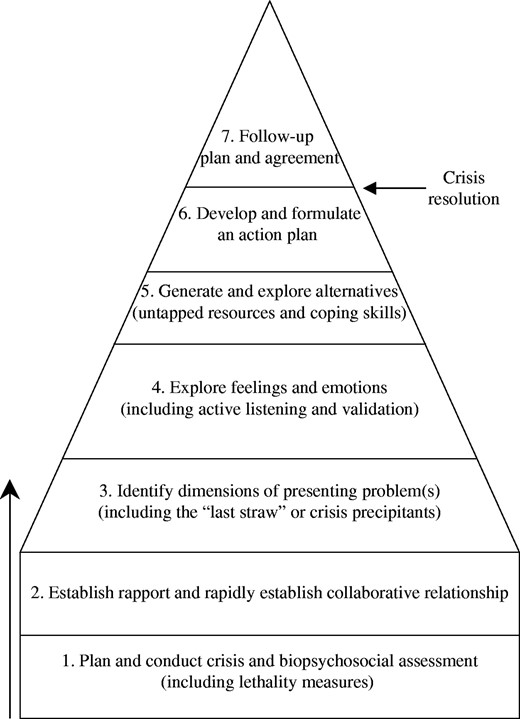1. Utilising social work theory
Social work theory has been discussed throughout this training and as a social worker you have your own knowledge in this area. Therefore, this section should be considered as merely a brief overview of some of the theories that have been identified for working in disasters for social workers to get you thinking about them and applying them to the specific context of disaster working. You are encouraged to review and revise relevant theories in more detail, and with a focus on your specific professional context and experience.
Complete short task 1 in workbook (10 minutes)
One of the theories highlighted regularly in research around disaster working is crisis intervention. While there is a wealth of literature on the topic of crisis intervention working, the following seven stage approach drawn from the work of Roberts and Otten (2005) is particularly pertinent to social work and can be implemented in most contexts when facing a crisis, including disasters:

This model starts at stage one, and moving up through the seven stages towards resolution and review (although there is some scope for moving up and down the stages). Taking the example of a fire, for example, this model could be utilised to support someone in the immediate aftermath, starting with immediate assessment of danger (ongoing risk to life or limb), and then building rapport to work with the individual or family around their ongoing problems, feelings and emotions until an action plan can be developed. More information about this model can be found here and should be read before trying to implement the model if you are unfamiliar with it.
Complete short task 2 in workbook (15 minutes)
Another important theory that social workers could draw on in these contexts is trauma informed working. Social workers, whether working in disaster contexts or in their day to day practice, frequently encounter people with a history of trauma, and so you likely have some experience in this area already, even if you do not explicitly utilise trauma informed approaches.
Trauma informed social work practice recognises the impact that trauma can have on people’s lives, and how many actions or behaviours that are characterised as problematic could otherwise be characterised as coping strategies for managing trauma. Social workers working from a trauma informed perspective highlight the importance of safety, trust, collaboration, choice and empowerment, as well as being constantly aware of not inadvertently exacerbating the trauma the individual is dealing with. Following a disaster this point becomes particularly important, because often the government has been in some way culpable for the disaster that has unfolded, and social workers are often working for that same government.
In the case of the Grenfell Tower Fire 2017, social workers working for Kensington and Chelsea local authority reported the difficulty they had in forging relationships due to their association with the council that many saw as to blame for the fire and ignoring the concerns of residents. Similarly social workers supporting people impacted by the Hillsborough Stadium disaster have described that the support they offered was not always well received, with social workers being perceived as representing the state. Research has found that many state-led initiatives that followed the Hillsborough disaster exacerbated the impact on those they were seeking to support (Coleman et al., 1990; Scraton, 1999).
Levenson (2017) suggests that trauma informed social work can be integrated into other models and workplaces, and her article on trauma-informed Social Work Practice should be read for more details on this approach.
Complete short task 3 in workbook (15 minutes)
Other theories that are highlighted as important for disaster informed social workers have been discussed in previous modules, including rights based working (Module 2), strengths based working (Module 3) and anti-oppressive practice (Module 2). If you are not confident in any of these areas, you are encouraged to revisit those sections, and take some time to explore these theories more.
Section links
- Utilising social work theory (current page)
- Creative responses
- Ethical responses
- Organisational support
- Self-care
- Follow up task
